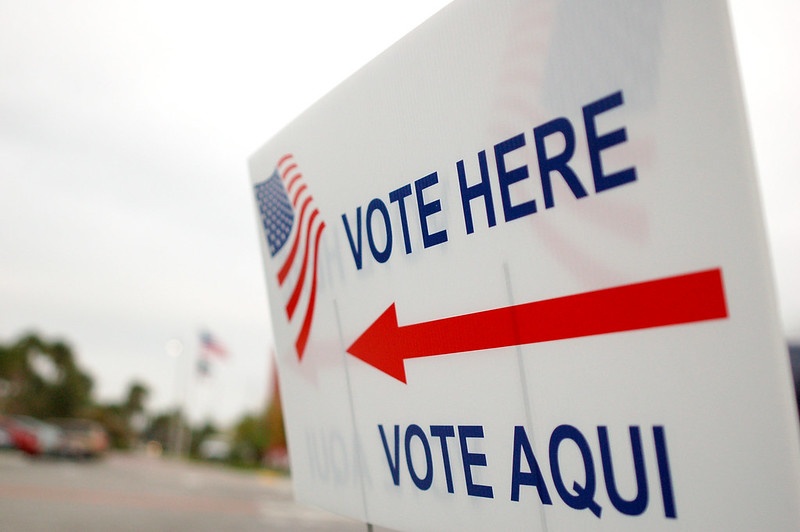Abortion, slavery, democracy: How the South's ballot measures fared

Voters in the South weighed in on 44 ballot measures during the midterms, rejecting abortion restrictions and removing racist language from state constitutions. (Photo by Erik Hersman via Flickr.)
The 2022 United States midterm elections proved to be less of a "red wave" than some pundits expected. With votes still being counted a week after the Nov. 8 election, Republicans have gained a narrow majority in the U.S. House of Representatives, thanks in no small part to extreme gerrymandering. Meanwhile, Democrats maintained control of the Senate, and the outcome of the Dec. 6 runoff election in Georgia between incumbent Democrat Raphael Warnock and Republican challenger Herschel Walker could strengthen the party's slim margin in the chamber.
These high-profile races grabbed headlines, but voters in 10 of the 13 Southern states also weighed in on a total of 44 ballot measures this November. Alabama had the most at 11, while there were none in Mississippi, North Carolina, and Virginia. Of the five major ballot issues trending this year — abortion rights, changes to the citizen initiative process, marijuana legalization, slavery as punishment for crime, and voting — all played out somewhere in the South.
Here is an overview of the most notable measures that were on the ballot in Southern states this year and how they fared:
- Kentuckians rejected a ballot measure to further restrict abortion rights. Over 52% of Kentucky voters rejected Amendment 2, a legislatively proposed ballot measure that would have amended the constitution to state there is no right to an abortion or public funding available for abortion care in the commonwealth. It was a crucial victory for abortion rights advocates ahead of Nov. 15 oral arguments in a court case challenging the Kentucky's two abortion bans. Tamarra Wieder, executive director of the Planned Parenthood affiliate that serves the state, said the case could not have proceeded if the amendment had passed. The outcome in Kentucky shows that, though they are under siege from conservative politicians, abortion rights have broad support among voters even in deep red states.
- Alabama and Tennessee voted against slavery, but Louisiana did not. Alabama and Tennessee voters approved legislatively referred amendments that remove from their constitutions provisions allowing slavery as a punishment for crime — a loophole stemming from the 13th Amendment to the U.S. Constitution that allows incarcerated people to be forced to work for little or no money. Alabamians voted 77-23 in favor of such a measure, which also strikes racist language from the state constitution, including a ban on interracial marriage. In Tennessee, 80% of voters approved updating the state constitution to clearly state that "slavery and involuntary servitude are forever prohibited," though the amendment does not bar inmates from working. Meanwhile, voters in Louisiana rejected a similar legislatively referred measure by a 61-39 margin at the urging of its sponsor, Democratic state Rep. Edmond Jordan, who was unhappy with the measure's final language and supports an effort to rewrite it and put it on the ballot again next year.
- Direct democracy wins in Arkansas, while legalized marijuana loses. Arkansas and Florida are the only two states in the South that allow citizens to directly amend their constitutions, as Facing South has reported. In Arkansas, this has led to the passage of progressive measures such as minimum wage increases that have not been embraced by the political establishment, which targeted that direct democracy this year with a legislatively referred amendment requiring a 60% supermajority to pass ballot measures. Arkansas voters rejected it by a 59-41 margin. But a citizen-initiated measure to legalize recreational marijuana failed, getting only 44% of the vote.
- Tennessee doubles down against unions. Tennessee has had an anti-union law on the books since 1947, but voters there still approved enshrining "right to work" in the state constitution, making it illegal for employers to require union membership as a condition of employment. The legislatively referred ballot measure passed by a margin of 70-30. All 13 states in the historically anti-union South have right to work laws in place, and four of them — Alabama, Arkansas, Florida, and Mississippi — have put right to work in their constitutions.
- West Virginia rejects property tax exemptions as well as expanding the legislature's power over schools. Voters in the Mountain State rejected all four legislatively referred constitutional amendments on this year's ballot. They included Amendment 2, which would have authorized the legislature to exempt personal property used for business activity from property taxes; it got only 35% of the vote. Amendment 4 would have allowed the state legislature to approve or deny decisions made by the West Virginia State Board of Education, which is largely appointed by the governor; only 42% of voters approved it.
The South's voters are not yet finished weighing in on ballot measures this year: On Dec. 10, Louisianans will vote on three additional legislatively referred ballot measures. Under the state's unique "majority-vote system," all candidates running for local, state, or federal office appear on the same ballot in October in odd-numbered years or November in even-numbered ones, regardless of partisan affiliations, with another election held in December to decide races no one won outright.
Amendment 1 would update the state constitution to explicitly bar noncitizens from voting. It's a preemptive move pushed by Republican Secretary of State Kyle Ardoin to prevent localities from giving noncitizens voting rights in local elections — something already barred at the federal level by a law Congress passed in 1996. The move comes as a growing number of local governments, none of them in the South, have decided to allow noncitizens to vote in local elections. Amendment 2 and Amendment 3, which would require the state Senate to confirm the governor's appointees to the Louisiana State Civil Service Commission and the Louisiana State Police Commission, would expand legislative power over the executive branch.
Tags
Elisha Brown
Elisha Brown is a staff writer at Facing South and a former Julian Bond Fellow. She previously worked as a news assistant at The New York Times, and her reporting has appeared in The Daily Beast, The Atlantic, and Vox.
